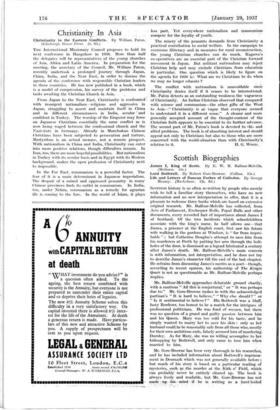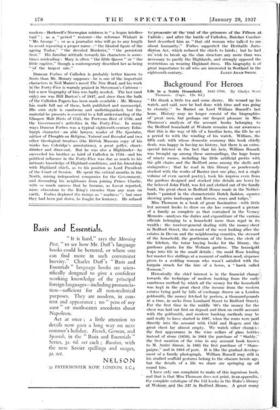Scottish Biographies
Lord Bothwell. By Robert Gore-Browne. (Collins. 15s.) Life and Letters of Duncan Forbes of Culloden. By Georgo Menary. (MacLohose. 12s. 6d.) Scornsu history is so often re-written by people who merely wish to tell a familiar story themselves, who have no new information and no new interpretation to offer, that it is a pleasure to welcome three books which are based on extensive original research. Mr. Balfour-Melville has collected, from Acts of Parliament, Exchequer Rolls, Papal Bulls and other documents, every recorded fact of importance about James I of Scotland. Of the two incidents which schoolchildren associate with the king's name, he half allows one—that James, a prisoner at the English court, first saw his future wife walking in the gardens at Windsor, is " far from imeoro- bable " ; but Catherine Douglas's attempt to save him from his murderers at Perth by putting her arm through the bolt- holes of the door, is dismissed as a legend fabricated a century after James's death. Mr. Balfour-Melville's main concern is with information, not interpretation, and he does not try' to describe James's character till the end of the last chapter. He refrains from discussing James's merits as a poet—though; according to recent opinion, his authorship of The Kingiu Quair is not as questionable as Mr. Balfour-Melville perhaps implies.
Mr. Balfour-Melville approaches" debatable ground charily, with a cautious " All this' is -conjectural," or " It was perhaps due to." Mr. Gore-Browne rushes in with the acknowledged partisan's " It is hard to believe," " Why else should ? " or " Is it sentimental to believe ? " His Bothwell was a bluff, lusty Borderer, too honest to be a match for the intrigues of professional politicians. He was fond of women, but there was no question of a grand and guilty passion between him and his Queen. Mary was too cold for his taste, and he simply wanted to marry her to save his skin : only as het husband could he be reasonably safe from all those who, mostly for their own ambitious ends, falsely accused him of murdering Darnley. As for Mary, she was no willing accomplice to her kidnapping by Bothwell, and only came to love him when married to him.
Mr. Gore-Browne has been very thorough in his researches, and he has included information about Bothwell's imprison- ment in Denmark which was not generally available before ; but much of his story is based on a particular reading. of mysteries,.. such as the murder at the. Kirk: o' Field, which can probably never be entirely cleated up. The book is always lively and readable, but Mr. Gore-Browne has not nude —up mind.' - he- is writing as a hard-boiled modem--Bothwelfs'Norwegian -mistress is "'a bogus- intellec. tual " ; as a " period " restorer—the reformer Wishart is " Mr. George " ; or as a journalist who will go to any length to avoid repeating a proper name7.-" the bloated figure of the ageing Tudor," " the devoted gorderer," " the persistent Scot." His familiar attitude towards his characters is some- times misleading : Mary is often " the little Queen " or " the little captive," though a contemporary described her as being " bf the largest size."
Duncan Forbes of Culloden is probably better known to Scots than Mr. Menary supposes—he is one of the important characters in Neil Munro's novel The New Road, and his work in the Forty-Five is warmly praised in Stevenson's Catriona- Ik a new biography of him was badly needed. The last (and only) one was Hill Burton's of 1847, and since then the bulk of the Culloden Papers has been made available : Mr. Menary his made full use of these, both published and manuscript. His own style is cumbrous and undistinguished, but the material he presents is essential to a full understanding of the Glasgow Malt Riots of 1725, the Porteous Riot of 1736, and the Government's activities in the Forty-Five. In many ways Duncan Forbes was a typical eighteenth-century Edin- burgh character—an able lawyer, reader of The Spectator, author of Thoughts on Religion, Natural and Revealed and two other theological treatises (the British Museum copy of his works has Coleridge's annotations), a great golfer, claret- drinker and diner-out. But he was also a Highlander—he succeeded his brother as laird of Culloden in 1734—and his pOlitical influence in the Forty-Five was due as much to his intimate knowledge of Highland conditions, and his friendship with Highland chiefs, as to his position as Lord President • of the Court of Session. He spent the critical months in the North, raising independent companies for the Government, and dissuading his neighbours from joining Prince Charlie, with so much success that he became, as Lovat reported, more obnoxious to the King's enemies than any man on earth. Forbes deplored the risings as " madness"; but once they had been put down, he fought for leniency. He refused totArroiediterat -the 'trial- of-the -prisoners of :the Fifteen at CaRisle ; and after the battle of Culloden, Butcher Cumber- land described him as " that old woman ivho talked to me about humanity." Forbes 'supported the Heritable Juris- diction Act, which reduced the chiefs to lairds ; but he had , no _wish to break up the clan structure any more than was necessary to pacify the Highlands, and strongly opposed the-.: restrictions on wearing Highland dress. His biography is of great importance to all who are interested in Scotland in the























































 Previous page
Previous page